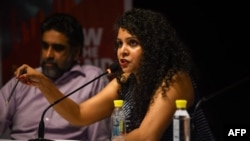A high-profile Indian journalist failed to obtain interim relief from the Delhi High Court that would have allowed her to travel to Europe to speak about harassment and intimidation of journalists in the world’s largest democracy.
Rana Ayyub is a prominent investigative journalist and fierce critic of Indian Prime Minister Narendra Modi and the Hindu nationalist ideology of his Bharatiya Janata Party. She was stopped from boarding an international flight at Mumbai airport Tuesday.
Ayyub was scheduled to fly to London to address a conference organized by the International Center for Journalists or ICFJ and deliver a speech at the editorial meeting of The Guardian newspaper April 1.
She was then due to fly from London to Rome to take part in the International Journalism Festival in Perugia, where, as the scheduled keynote speaker, Ayyub was to deliver a lecture titled, “When the State attacks: journalism under fire in the world's biggest democracy,” April 8.
The April 1 programs in the United Kingdom were canceled after Ayyub failed to fly to London.
According to Ayyub, the Enforcement Directorate (ED), which investigates financial crimes, issued a summons while she was already at Mumbai airport to catch the flight to London. Known as a Look Out Circular (LOC), the summons that prevented her from flying Tuesday was related to an investigation the directorate is conducting into the alleged misuse of donations collected by Ayyub for relief work during the COVID-19 pandemic. The journalist denies the charges.
Ayyub petitioned the Delhi High Court Thursday, seeking permission to travel outside of India. Following opposition from the ED, however, the court refused to quash the LOC, meaning she cannot travel abroad for now. While the court directed the ED to file a status report on its case against Ayyub, the matter has been listed for a new hearing April 4.
Ayyub, 37, is an independent journalist who also writes for The Washington Post. She has faced social media harassment including rape and death threats, from Hindu right-wing groups, that mostly began when her book Gujarat Files was published in 2016. In the book, she alleged that officials of the BJP-led government of Gujarat had been complicit in an anti-Muslim massacre that shook the state in 2002.
Ayyub is often critical of the activities of the Hindu right-wing groups and political leaders. In social media, far-right Hindu supporters of Modi regularly abuse and threaten her for her write-ups highlighting the [alleged] harassment and persecution of Muslims in India. Attacks against Ayyub have escalated since the ED froze her bank accounts and accused her of laundering money in February.
Ayyub has denied the allegation that the ED leveled against her. She has called the actions by the agency an attempt to intimidate her.
Lawyer Vrinda Grover, who represented Ayyub in the Delhi court said, that her client was being harassed by the ED because she was a critic of the government.
The Washington Post recently put out a full-page advertisement in support of Ayyub, saying that free press in India is under attack. In February, rights experts at the United Nations sought that the “judicial harassment against her [be] brought to an end at once.”
Media watchdogs have condemned the Indian government’s actions against Ayyub.
“Preventing Rana Ayyub from traveling abroad is another incident in a growing list of unjustified and excessive actions taken by the Indian government against the journalist,” Steven Butler, Asia program coordinator of the New York-based Committee to Protect Journalists, said in a statement.
“Indian authorities should immediately cease all forms of harassment and intimidation against Ayyub.”
Julie Posetti, vice president of global research at ICFJ and an expert in online attacks against women journalists, said that Indian authorities are trying to criminalize Ayyub’s practice of journalism.
“Not only is Rana Ayyub subjected to the most prolific orchestrated online violence I’ve ever witnessed or studied, she’s experiencing state-linked legal harassment, and now she’s had her right to freedom of movement violated. These acts are clearly a form of retaliation for her critical reporting and commentary on the ruling BJP party and PM Modi’s government,” Posetti told VOA.
Ayyub’s attackers want to silence and isolate her from the international journalism community, Posetti noted.
“But we are standing at her side and demand that she be allowed to travel to Italy to deliver her keynote address at the International Journalism Festival in Perugia,” she said.




